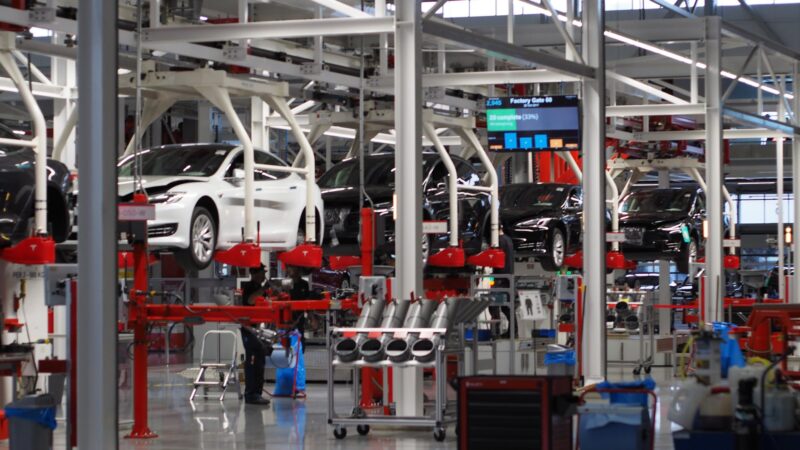Brexit has to be treated as a collective bargaining issue, a new report for Unite shows.

Pic: Many car companies have said Brexit is behind layoffs and cancelled investment.
As Parliament heads towards so-called ‘Super Saturday’, it is worth remembering that Brexit is not simply a Parliamentary issue, it’s an industrial issue too.
So it is timely that Unite, the UK and Ireland’s largest trade union, this week publishes a study based on interviews conducted with Unite workplace reps across all sectors, UK regions and devolved countries. It provides the clearest insight yet into how Brexit is playing out in workplaces across Britain and the attitudes and experiences of unionised workers.
It reveals that three years of uncertainty has led to division, frustration and fatigue which combine to further disempower workers. But it also shows that by recognising Brexit as a collective bargaining issue, workers can genuinely take back control and shape Brexit where it matters: at work.
Three key issues emerged from the 50 semi-structured interviews carried out: Brexit uncertainty, employer opportunism, and reps’ industrial responses to Brexit.
Over three years on from the Brexit referendum it is overwhelmingly clear that the uncertainty is being handed down to working people. At worst this comes in the form of threats to jobs or opportunistic attacks on pay and conditions. At best, Brexit obscures and accelerates existing industrial issues, such as austerity in the public services or the precariousness of migrant workers.
During this study – interviews were carried out between February and June 2019 – the focus on the political machinations surrounding Brexit reached fever pitch, with failed meaningful votes, fraught international summits and the resignation of a Prime Minister; yet the overwhelming response has been an increasing ‘Brexit fatigue’ among trade union members and reps alike.
A major finding is that against the backdrop of ongoing political crisis, some employers – particularly in manufacturing – have fuelled anxiety amongst workers with threats and warnings of withdrawing their investment in the event of the UK leaving the EU without a satisfactory deal.
Reps also reported that Brexit has often merged with existing issues – such as austerity in the public sector and restructuring and automation in the private sector – that has made it increasingly difficult to defend their members’ pay, rights, and terms and conditions.
Interviewees reported that opportunism is most commonly manifested as attempts to justify low pay in negotiations, attempts to offshore or cut employment, to block reps from European Works Councils or increase agency workers over full time employment. Precarious workers have also been impacted, with reps giving examples of agency staff being laid off and EU nationals returning to their home countries, both as a result of Brexit uncertainty.
The main concern for reps over Brexit was overwhelmingly the impact on jobs caused by disruption to industry (46%) followed by workers’ rights (22%), safety regulations (8%) and the rise in racism (8%).
This opportunism is being resisted by Unite reps, however. 60% of reps interviewed report taking some form of action to mitigate the industrial impact of Brexit. Of these, over a quarter (28%) have mobilised their members to secure an agreement that either defends (16%) or improves (12%) their existing pay and conditions. Reps have also been using Unite’s Workplace Brexit Agreement Template to secure assurances from their employer.
The report shows that workers and trade unionists are not simply bystanders to the whims of big business and the government but can play an active role in the outcome of Brexit even in sectors that are in the grip of uncertainty and employer opportunism.
There is a growing sense of frustration and ‘Brexit fatigue’ among reps – both leavers and remainers – that Brexit is prolonging uncertainty and has distracted from other key issues (such as austerity). However, the report demonstrates that treating Brexit as a collective bargaining issue is critical to overcoming Brexit fatigue and fatalism which is proving divisive in workplaces.
There have been many times over the last three years when the UK believed it had reached peak uncertainty, but this study shows that Unite reps are proving that it is through trade unionism that we can protect and advance the interests of working people irrespective of what Brexit may bring.
John Earls is Director of Research at Unite the Union, and Andrew Waterman is a PhD Researcher at the University of Portsmouth.
Read the report here.




One Response to “Report: How unions are facing down the industrial impact of Brexit at work”
Tony Simpson
Brexit will deprive Britons of status and rights as EU citizens. As a Unite Member, how will Unite uphold and defend our rights codified in Charter of Fundamental Rights of the European Union?